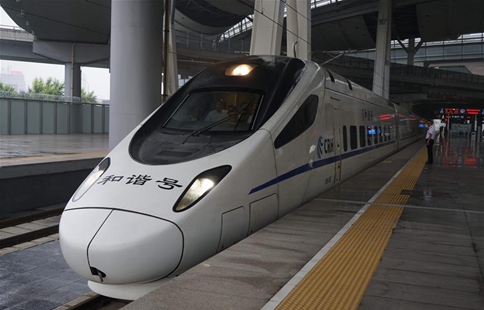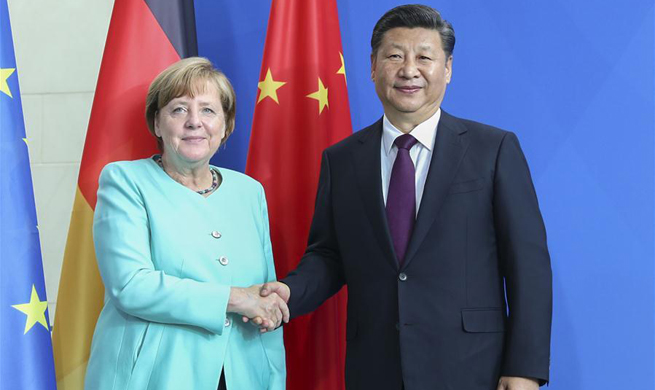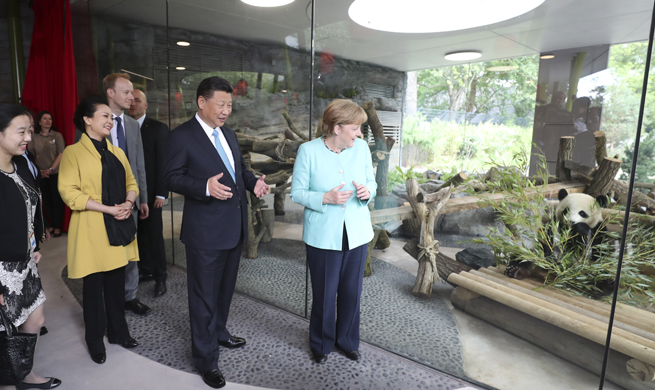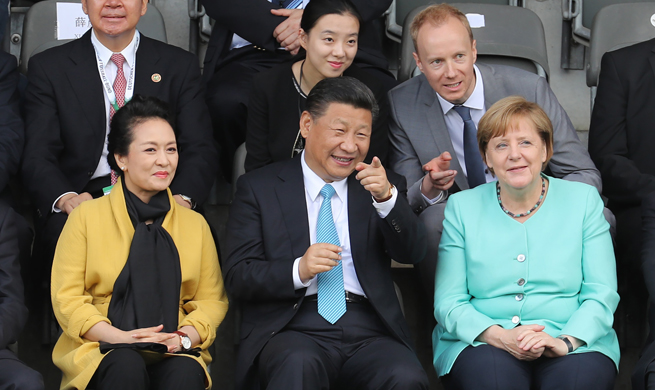by Xinhua writer Zhu Sheng
BERLIN, July 5 (Xinhua) -- While a surge of anti-globalization sentiment in Western countries casts a shadow on the Hamburg summit of the Group of 20 (G20) major economies to be held on July 7-8 in Germany, the China-proposed Belt and Road Initiative inspires the group with new ideas of cooperation.
The anti-globalization sentiment has been highlighted by the U.S. policy of America First, Brexit and the U.S. withdrawal from Paris climate accord, among others. Under the circumstances, business leaders have considered the Belt and Road Initiative as an inspiration for the G20 group to boost mutually beneficial cooperation within its framework.
The world needs a plan B against the anti-globalization sentiment of the administration of U.S. President Donald Trump, highlighted by Trump's America First policy, said Tufan Khalaji, managing director of Rail Cargo Operator of Austria.
The Belt and Road Initiative provides the whole world at the right moment with a new option and solution, he noted.
The initiative, proposed by China in 2013, aims to build trade and infrastructure networks connecting Asia with Europe and Africa along ancient Silk Road trade routes to seek common development and prosperity.
For example, as far as Europe is concerned, the China-Europe freight train service to promote interconnectivity not only facilitates flow of commodities, but also brings opportunities to countries along Eurasian railway routes to improve railway infrastructure and transport system.
The China-Europe freight train service, whose operation was first launched in March 2011, has witnessed a remarkable increase in transport volume boosted by the initiative.
Citing the experiences of German logistics company Deutsche Post DHL Group, Thomas Kowalski, DPDHL director of operations in multimodal transport, said the Belt and Road Initiative expands the freight volume of railway routes connecting China and Europe, which boosts DHL's business.
"It opens up new opportunities for DHL in the Asian-Pacific region," he said.
The freight volume of Eurasian railway lines has steadily increased since the operation of China-Europe freight train service. It is estimated that the volume will exceed 1 million standard containers by 2030, according to Kowalski.
Shan Jing, business development manager of Far East Land Bridge Ltd.(FELB), said the China-Europe freight train service also facilitates the transport of goods between Europe and other Asian countries such as Japan and South Korea.
Currently, the trans-continental trains operated by FELB depart mainly from cities including Suzhou and Changsha in southern China, leaving China from Manchuria in the northeast. Every week, three or four trains arrive in European cities such as Warsaw, Duisburg, Hamburg and Milan.
In addition, Shan said the Belt and Road Initiative brings opportunities to countries along Eurasian railway routes to promote freight transport capacity through improving railway infrastructure and organizing the railway transport system.
Germany's International Rail Freight Business Association (IBS), which partly functions as promoter or lobbyist for efficient train systems and mechanisms in the European Union (EU), welcomes the China-proposed Belt and Road Initiative.
IBS Chairman Olaf Krueger said the initiative may provide great opportunities for countries to modernize the existing rail lines and create new transport corridors.
In addition, the direct rail link between Chinese cities and western Europe offers a new option for shippers. Some European business people call it an "artery" as it injects fresh blood into the existing European rail freight corridors or networks.
Success stories like the China-Europe freight train service are believed to be significant to leaders to attend the G20 Hamburg summit themed "Shaping an Interconnected World."
Chinese President Xi Jinping will attend the G20 Hamburg summit following a state visit to Germany. Xi has called on the G20 group to continue to champion globalization and innovative growth.
The Belt and Road Initiative has won support from over 100 countries and international organizations around the world.


















